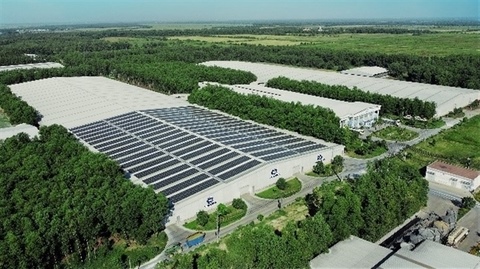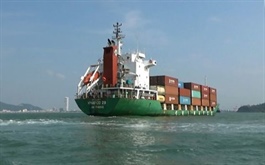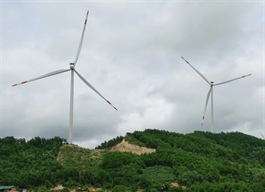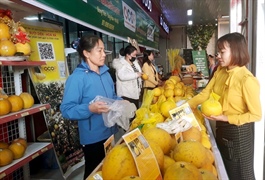Green development gains momentum in VN's listed business community
Green development gains momentum in VN's listed business community
The shift towards green development within the listed business community has become increasingly apparent.

A milk farm of Việt Nam Dairy Products Joint Stock Company (Vinamilk). In 2022, Vinamilk took the lead as a pioneer among listed enterprises by implementing greenhouse gas inventory according to ISO 14064 standards for its factory and farm systems, as part of its sustainable development strategy. — Photo courtesy of Vinamilk |
The Government's strong commitment to achieving net zero emissions by 2050 has spurred the promotion and dissemination of the green development trend from the central Government to localities, the business community, and investors.
Specifically, the transition to green development in the listed business community has become more evident in recent years.
In 2022, Việt Nam Dairy Products Joint Stock Company (Vinamilk) took the lead as a pioneer among listed enterprises by implementing greenhouse gas inventory according to ISO 14064 standards for its factory and farm systems, as part of its sustainable development strategy.
Vinamilk has successfully implemented numerous initiatives related to the circular economy, including promoting the use of green energy in production activities. Currently, all of Vinamilk's farms have installed solar energy systems. The company has also increased investments in environmentally friendly technology and focused on biodiversity, particularly through tree planting to offset greenhouse gases.
In 2023, Gemadept Joint Stock Company achieved an important milestone as a pioneer in implementing environmental, social, and governance (ESG) programmes and greenhouse gas inventory in the mining, port exploitation, and logistics sectors in Việt Nam.
Gemadept collaborated with the British Standards Institute (BSI) to provide training and report on greenhouse gas emissions according to international standards ISO 14064-1:2018 at Nam Đình Vũ and Gemalink ports. These activities aided Gemadept in reviewing and optimising their production and business activities, leading to more efficient use of energy and water, as well as improved prevention and management of operational risks.
Moving forward, Gemadept plans to continue conducting greenhouse gas inventories at other ports within their port system. They will also develop a roadmap to reduce emissions, aligning with the Government's commitment to carbon neutrality.
Vinamilk and Gemadept are not the only companies that have clearly defined their green and sustainable development strategies in recent years, particularly after committing to achieve "net zero" carbon emission by 2050. Furthermore, an increasing number of businesses are now issuing separate sustainability reports in addition to their customary annual reports.
According to the Organising Committee of the Việt Nam Listed Companies Awards, the number of companies preparing separate sustainable development reports and advancing to the final round has slightly increased from 19 in 2022 to 21, representing an increase of over 10 per cent. This trend continues the upward momentum observed in previous years.
The sustainable development reports of Vietnamese businesses have introduced several groundbreaking points. For instance, Bảo Việt Group became the first Vietnamese company to reach the final round of evaluation for its sustainable development report, incorporating an ESG assessment based on Dow Jones' international standards. Similarly, Gemadept became the first Vietnamese company to utilise greenhouse gas emissions inspection services from an ISO14064-certified unit.
Moreover, Vietnamese businesses are adopting various information disclosure frameworks beyond the Global Reporting Initiative (GRI), such as the Carbon Disclosure Project (CDP). Some companies have also made commitments to specific Net Zero goals with defined timelines, like Vinamilk and Gemadept, in terms of disclosing greenhouse gas emissions information.
There is an increasing number of companies adopting the ESG committee model under their board of directors. This reflects the growing attention that boards are giving to ESG issues.
According to Trần Anh Đào, deputy general director of the HCM Stock Exchange (HOSE), green growth, green development, and addressing climate change are trends shaping the global economy's future.
In Việt Nam, the green agenda has garnered significant interest and is being promoted and embraced at the central, local and business levels. Good corporate governance is essential and should be aligned with environmental impact management and social responsibility. This factor plays a crucial role in evaluating businesses for investors, especially foreign investors, partners, and stakeholders.
In fact, there is increasing "pressure" for green development in the financial market. During the 2022-23 period, many institutional investors are demanding more serious implementation of ESG practices from the businesses they invest in.
Don Lâm, general director and founding shareholder of VinaCapital Group, stated that many banks and international investment funds now consider ESG standards increasingly important in their investment decisions. Consequently, projects and businesses that do not meet ESG standards may face difficulties in accessing capital. Additionally, consumers are increasingly inclined to support sustainable and transparent companies.
Dominic Scriven, chairman of Dragon Capital Vietnam Fund Management Company, mentioned that both domestic and foreign customers are urging the fund to comply with ESG principles in its investments. Customers seek specific information about Dragon Capital's actions, strategies, and progress measurement.
However, funds face challenges in measuring emissions across their portfolios due to the limited number of companies doing so. As a result, Dragon Capital has to engage a foreign company to assess the emissions of its portfolio by comparing its holdings with international companies in the same industry. This presented a significant challenge for Dragon Capital.
Evaluating and measuring the environmental impact of investment portfolios not only helps companies understand ESG-related risks better but also meets the increasing demands for transparency and social responsibility from customers. To attract high-quality and long-term capital from investors and financial institutions, ESG and green transition investments should be viewed as opportunities rather than costs, said Scriven.
























